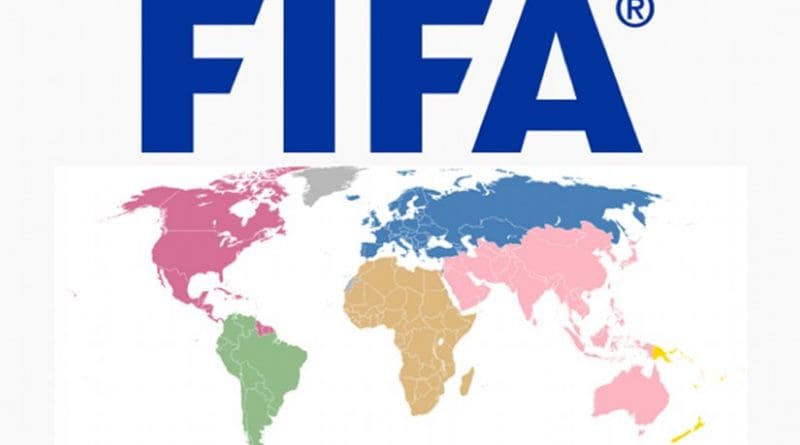FIFA: 2026 World Cup Bids Test Reforms, Says HRW
The new FIFA requirements on human rights in bidding and hosting the 2026 World Cup could raise the bar for future sports events if they are fully carried out, Human Rights Watch said. FIFA voters will select the 2026 World Cup host at the 68th FIFA Congress, which will convene in Moscow on June 13, 2018. The “United” bid by the Canadian Soccer Association, the Mexican Football Association and the United States Soccer Federation is competing with the Moroccan Football Association to host the 2026 games.
Alongside its 2017 Human Rights Policy, the new Fédération Internationale de Football Association (FIFA) bidding requirements for 2026, include due diligence about existing human rights conditions and a requirement for the bidding countries to submit a human rights strategy in preparing for and hosting the 48-team tournament. The World Cup for 2018 opens in Russia on June 14, and is set for Qatar in 2022.
“What is new about the 2026 process is that it is the first time bidding countries are required to disclose human rights risks and what they will do to address them,” said Minky Worden, director of global initiatives at Human Rights Watch. “With serious human rights concerns in both Russia and Qatar, FIFA needs to insist that the 2026 host rigorously complies with basic human rights rules – or risk being ruled out as qualified to host.”
Russia’s World Cup launches on June 14 in the worst climate for human rights in a generation. Starting in 2012 the authorities adopted new measures to stifle freedoms of assembly, association, and expression. Construction workers who built World Cup stadiums faced exploitation and dangerous conditions. Russia’s anti-LGBT “propaganda law” creates a climate of fear and discrimination. In January, police in Chechnya, the team home base for the Egyptian national team, arrested 60-year-old Oyub Titiev, the Grozny director for Memorial, Russia’s leading independent human rights organization. Arsonists torched a Memorial office and car. Titiev remains in detention.
Both the Morocco bid (381 pages) and the “United” bid (474 pages) cover a wide range of topics, including host city information, stadiums, transport infrastructure, and team facilities. The new human rights and labor requirements include safeguarding children from sexual or other abuses, freedom of expression, supply chain transparency, and media freedom.
The two bids were assessed in reports by BSR (Business for Social Responsibility), an independent outside expert hired by FIFA, on the quality of the human rights risk assessment, how meaningful the role for stakeholders, including workers’ unions and civil society, is in monitoring human rights compliance, and the quality of the strategy to mitigate the risks identified. Both bids received a “medium” human rights risk rating.
Human Rights Watch 2018 reports on the United States, Canada, Mexico, and Morocco identify serious concerns, including the US government’s efforts to impose immigration bans on persons from several Muslim countries; Mexico’s climate of impunity in the face of the murders of journalists, Canada’s violations of the rights of indigenous populations, and Morocco’s persecution of LGBT people under article 489 of the penal code, which stipulates prison terms of six months to three years for “lewd or unnatural acts with an individual of the same sex.”
Whichever bid is successful, Human Rights Watch will continue to monitor human rights conditions in the host country or countries.
Inadequate protections and worker fatalities on World Cup sites have been a grim problem in both Russia and Qatar. According to Building Workers International (BWI), 21 workers died in stadium construction for the Russia World Cup, including a North Korean laborer who died in the shipping container where he lived. Human Rights Watch has documented serious risks to migrant construction workers in Qatar building stadiums and infrastructure in the country’s intense heat and humidity.
FIFA has taken positive steps in the last two years to improve respect for human rights in its operations. In April 2016, FIFA revised its statutes to include the statement, “FIFA is committed to respecting all internationally recognized human rights and shall strive to promote the protection of these rights.” In May 2016, it announced that human rights requirements would be part of the consultation and bid process phases of the selection of the 2026 World Cup host.
In September 2016, FIFA created and staffed a human rights manager position to develop its human rights-related work, and in March 2017, it established an independent Human Rights Advisory Board to provide advice and report on FIFA’s implementation of its human rights commitments. In May 2017, FIFA released a new Human Rights Policy promising rights protection across its global operations.
Human Rights Watch made recommendations to FIFA on the bidding requirements, and was one of the 30 non-governmental organizations the “United” bid consulted as part of its human rights stakeholder consultation.
FIFA inspection teams visited all prospective host countries in 2018 to evaluate conditions as part of the bid process. Human Rights Watch said that FIFA should ensure that the 2026 host contract includes specific provisions on commitments to ensure that human rights are respected and protected in the preparations for hosting and staging of the tournament, as well as sanctions for not complying.
“FIFA needs to end the era when hosts can use the World Cup to ‘sportswash’ human rights abuses in their countries and burnish their international reputation while failing to live up to international human rights requirements,” Worden said. “The 2026 reforms are an important start.”

